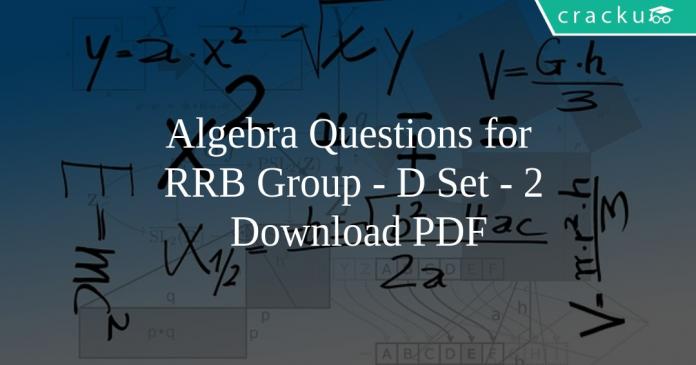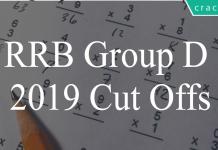Algebra Questions for RRB Group – D Set – 2 PDF
Download Top-15 RRB Group-D Algebra Questions set-2 PDF. RRB GROUP-D Maths questions based on asked questions in previous exam papers very important for the Railway Group-D exam.
Download Algebra Questions for RRB Group – D Set – 2 PDF
Download RRB Group-D Previous Papers PDF
Take a RRB Group-D free mock test
Question 1: If $\frac{a}{1-a} + \frac{b}{1-b} + \frac{c}{1-c} = 1$ the the value of $\frac{1}{1-a} + \frac{1}{1-b} + \frac{1}{1-c}$
a) 1
b) 3
c) 4
d) 0
Question 2: If $a^x = (x+y+z)^y$ , $a^y =(x+y+z)^z$ and $a^z = (x + y + z)^x$ , then the value of x + y + z (given a ≠ 0) is
a) 0
b) $a^3$
c) 1
d) a
Question 3: If $x^2 – 3x + 1= 0$ and x > 1, then the value of $(x – \frac{1}{x})$
a) √5 only
b) 1
c) √5 only
d) ±√5
Take a free mock test for RRB Group-D
770 Mocks (cracku Pass) Just Rs.199
Question 4: If $x = \frac{\sqrt{5}-2}{\sqrt{5}+2}$, then $x^4 + x^{-4}$ is
a) a surd
b) a rational number but not an integer
c) an integer
d) an irrational number but not a surd
Question 5: The value of $(\sqrt{5}+\sqrt{3})(\frac{3\sqrt{3}}{\sqrt{5}+\sqrt{2}} – \frac{\sqrt{5}}{\sqrt{3}+\sqrt{2}})$ is
a) 0
b) $2-\sqrt{2}$
c) $2\sqrt{2}$
d) $3$
Question 6: If x and y are positive real numbers and xy = 8, then the minimum value of 2x + y is
a) 9
b) 17
c) 10
d) 8
Question 7: If x = 3 + 2√2 , then find the value of $x^2 + \frac{1}{x^2}$
a) 36
b) 30
c) 32
d) 34
RRB Group D previous year papers
Question 8: if $\frac{a}{b} + \frac{b}{a} – 1$ = 0, then the value of $a^3 + b^3$ is
a) 3
b) 0
c) 1
d) -1
Question 9: If (a – b) = 3, (b – c) = 5 and (c – a) = 1, then the value of $\frac{a^3 + b^3 + c^3 – 3abc}{a + b + c}$ is
a) 17.5
b) 20.5
c) 10.5
d) 15.5
Question 10: $3 – \frac{3+\sqrt{5}}{4} – \frac{1}{3 + \sqrt{5}}$
a) 0
b) 3/2
c) √5/2
d) √5
Question 11: If $x + \frac{1}{x} = 12 $, the value of $x^2 + \frac{1}{x^2}$ is
a) 142
b) 126
c) 113
d) 129
RRB Group-D Important Questions (download PDF)
Question 12: If $x^4 + \frac{1}{x^4} = 23$, then the value of $(x-\frac{1}{x})^2$ will be
a) 7
b) – 7
c) – 3
d) 3
Question 13: If $ x = \sqrt{\frac{\sqrt{5} + 1}{\sqrt{5} – 1}}$, then the value of $5x^2 – 5x -1 $ is
a) 0
b) 3
c) 4
d) 5
Question 14: The value of $\frac{3\sqrt{2}}{\sqrt{3} + \sqrt{6}} – \frac{4\sqrt{3}}{\sqrt{6}+\sqrt{2}} + \frac{\sqrt{6}}{\sqrt{3}+\sqrt{2}} $ is
a) 4
b) 0
c) √2
d) 3√6
Question 15: If a + 1/a+2 = 0, then the value of $(a+2)^{2}+\frac{1}{(a+2)^{3}}$ is
a) 2
b) 6
c) 4
d) 3
General Science Notes for RRB Exams (PDF)
Answers & Solutions:
1) Answer (C)
Expression : $\frac{a}{1-a} + \frac{b}{1-b} + \frac{c}{1-c} = 1$
Let’s put each term equal to each other
=> $3\frac{a}{1 – a} = 1$
=> $3a = 1 – a$
=> $a = \frac{1}{4} = b = c$
To find : $\frac{1}{1-a} + \frac{1}{1-b} + \frac{1}{1-c}$
= $\frac{1}{1 – \frac{1}{4}} + \frac{1}{1 – \frac{1}{4}} + \frac{1}{1 – \frac{1}{4}}$
= $3 \times \frac{4}{3} = 4$
2) Answer (D)
Expressions : $a^x = (x+y+z)^y$
$a^y =(x+y+z)^z$
$a^z = (x + y + z)^x$
Multiplying above equations, we get :
=> $a^x \times a^y \times a^z = (x + y + z)^x \times (x + y + z)^y \times (x + y + z)^z$
=> $(a)^{x + y + z} = (x + y + z)^{x + y + z}$
Since the power on both sides is same, thus :
=> $x + y + z = a$
3) Answer (D)
Expression : $x^2 – 3x + 1= 0$
=> $x^2 + 1 = 3x$
Dividing by $(x)$ on both sides
=> $x + \frac{1}{x} = 3$
$\because (x – \frac{1}{x})^2 = (x + \frac{1}{x})^2 – 4$
=> $x – \frac{1}{x} = \sqrt{9 – 4}$
=> $(x – \frac{1}{x}) = \pm\sqrt{5}$
4) Answer (C)
Given : $x = \frac{\sqrt{5}-2}{\sqrt{5}+2}$
=> $x = \frac{\sqrt{5}-2}{\sqrt{5}+2}\times(\frac{\sqrt5-2}{\sqrt5-2})$
=> $x=\frac{(\sqrt5-2)^2}{5-4}$
=> $x=9-4\sqrt5$ ————(i)
Similarly, $\frac{1}{x}=9+4\sqrt5$ ————-(ii)
To find : $x^4 + x^{-4}=x^4+\frac{1}{x^4}$
= $(x^2+\frac{1}{x^2})^2-2$
= $[(x+\frac{1}{x})^2-2]^2-2$
Substituting values from equations (i) and (ii), we get :
= $[(9-4\sqrt5+9+4\sqrt5)^2-2]^2-2$
= $[324-2]^2-2$
= $103684-2=103682$, which is an integer.
=> Ans – (C)
5) Answer (C)
$(\sqrt{5}+\sqrt{3})(\frac{3\sqrt{3}}{\sqrt{5}+\sqrt{2}} – \frac{\sqrt{5}}{\sqrt{3}+\sqrt{2}})$
=$(\sqrt{5}+\sqrt{3})(\frac{3\sqrt{3}}{\sqrt{5}+\sqrt{2}} * \frac{\sqrt{5}-\sqrt{2}}{\sqrt{5}-\sqrt{2}}- {\frac{\sqrt{5}}{\sqrt{3}+\sqrt{2} }x \frac{\sqrt{3}-\sqrt{2}}{\sqrt{3}-\sqrt{2}}})$
= $(\sqrt{5}+\sqrt{3})(\sqrt{15} – \sqrt{6} – \sqrt{15} + \sqrt{10})$ = $(\sqrt{5}+\sqrt{3})(\sqrt{10}-\sqrt{6})$ = $2\sqrt{2}$
6) Answer (D)
As $x$ & $y$ are positive real numbers, we can use AM $\geq$ GM
Let two numbers be $2x$ and $y$
=> $\frac{2x + y}{2} \geq \sqrt{2xy}$
=> $2x + y \geq 2\sqrt{16}$
=> $2x + y \geq 8$
=> Minimum value of $(2x + y)$ is 8
7) Answer (D)
Expression : $x = 3 + 2\sqrt{2}$
=> $\frac{1}{x} = \frac{1}{3 + 2\sqrt{2}}$
=> $\frac{1}{x} = \frac{1}{3 + 2\sqrt{2}} \times \frac{3 – 2\sqrt{2}}{3 – 2\sqrt{2}}$
=> $\frac{1}{x} = 3 – 2\sqrt{2}$
$\therefore$ $x + \frac{1}{x} = 3 + 2\sqrt{2} + 3 – 2\sqrt{2} = 6$
Squaring both sides, we get :
=> $(x + \frac{1}{x})^2 = 6^2$
=> $x^2 + \frac{1}{x^2} + 2 = 36$
$\therefore x^2 + \frac{1}{x^2} = 34$
8) Answer (B)
Expression : $\frac{a}{b} + \frac{b}{a} – 1 = 0$
=> $\frac{a^2 + b^2}{ab} = 1$
=> $a^2 + b^2 = ab$ ———-Eqn(1)
To find : $a^3 + b^3$
= $(a + b) (a^2 + b^2 – ab)$
Using eqn(1), we get :
= $(a + b) (ab – ab)$
= 0
9) Answer (A)
it is given that (a – b) = 3, (b – c) = 5 and (c – a) = 1
we need to find the value of $\frac{a^3 + b^3 + c^3 – 3abc}{a + b + c}$
as we know that ${a^3 + b^3 + c^3}$ = $(a+b+c)({a^2 + b^2 + c^2 – ab – bc – ac})$ ……..(5)
and ${(a-b)^2 = a^2 + b^2 – 2ab}$…….(1)
${(b-c)^2 = b^2 + c^2 – 2cb}$………..(2)
${(c-a)^2 = a^2 + c^2 – 2ac}$……….(3)
adding 1 , 2 and 3
17.5 = $({a^2 + b^2 + c^2 – ab – bc – ac}$ …..(4)
Now using 4 and 5 statement
$\frac{a^3 + b^3 + c^3 – 3abc}{a + b + c}$ = 17.5
10) Answer (B)
Expression : $3 – \frac{3+\sqrt{5}}{4} – \frac{1}{3 + \sqrt{5}}$
= $3 – \frac{3+\sqrt{5}}{4} – [\frac{1}{3 + \sqrt{5}}\times(\frac{3-\sqrt5}{3-\sqrt5})]$
= $\frac{12-3-\sqrt5}{4}-(\frac{3-\sqrt5}{9-5})$
= $\frac{9-\sqrt5}{4}+ (\frac{-3+\sqrt5}{4})$
= $\frac{9-3-\sqrt5+\sqrt5}{4}=\frac{6}{4}=\frac{3}{2}$
=> Ans – (B)
11) Answer (A)
it is given that $x + \frac{1}{x}$ = 12
we need to find value of $x^2 + \frac{1}{x^2}$
$x^2 + \frac{1}{x^2}$ = $(x + \frac{1}{x})^2$ – 2
= $12^2 – 2$ = 142
12) Answer (D)
it is given that $x^4 + \frac{1}{x^4} = 23$
$x^2 + \frac{1}{x^2}$ = $\surd(25)$ = 5
we need to calculate $(x-\frac{1}{x})^2$ = $x^2 + \frac{1}{x^2} – 2$
= 5 – 2 = 3
13) Answer (C)
Given : $ x = \sqrt{\frac{\sqrt{5} + 1}{\sqrt{5} – 1}}$
=> $ x = \sqrt{\frac{\sqrt{5} + 1}{\sqrt{5} – 1}\times (\frac{\sqrt5+1}{\sqrt5+1})}$
=> $x=\sqrt{\frac{(\sqrt5+1)^2}{5-1}}$
=> $x=\frac{\sqrt5+1}{2}$ ————–(i)
Squaring both sides, we get : $x^2=\frac{6+2\sqrt5}{4}$ ————–(ii)
To find : $5x^2 – 5x -1 $
= $5(x^2-x)-1$
Substituting values from equations (i) and (ii), we get :
= $5[(\frac{6+2\sqrt5}{4})-(\frac{\sqrt5+1}{2})]-1$
= $5\times(\frac{6+2\sqrt5-2\sqrt5-2}{4})-1$
= $5\times1-1=4$
=> Ans – (C)
14) Answer (B)
Expression : $\frac{3\sqrt{2}}{\sqrt{3} + \sqrt{6}} – \frac{4\sqrt{3}}{\sqrt{6}+\sqrt{2}} + \frac{\sqrt{6}}{\sqrt{3}+\sqrt{2}} $
= $\frac{3\sqrt2(\sqrt6+\sqrt2)(\sqrt3+\sqrt2)-4\sqrt3(\sqrt3+\sqrt6)(\sqrt3+\sqrt2)+\sqrt6(\sqrt3+\sqrt6)(\sqrt6+\sqrt2)}{(\sqrt3+\sqrt6)(\sqrt6+\sqrt2)(\sqrt3+\sqrt2)}$
= $\frac{1}{(\sqrt3+\sqrt6)(\sqrt6+\sqrt2)(\sqrt3+\sqrt2)}\times$ $[3\sqrt2(\sqrt{18}+\sqrt{12}+\sqrt6+\sqrt4)-4\sqrt3(\sqrt9+\sqrt6+\sqrt{18}+\sqrt{12}) + \sqrt6(\sqrt{18}+ \sqrt6+\sqrt{36}+\sqrt{12})]$
= $\frac{1}{(\sqrt3+\sqrt6)(\sqrt6+\sqrt2)(\sqrt3+\sqrt2)}\times$ $[3\sqrt2(3\sqrt2+2\sqrt3+\sqrt6+2)-4\sqrt3(3+\sqrt6+3\sqrt2+2\sqrt3)+ \sqrt6(3\sqrt2+\sqrt6+6+2\sqrt3)]$
= $\frac{1}{(\sqrt3+\sqrt6)(\sqrt6+\sqrt2)(\sqrt3+\sqrt2)}\times$ $[(18+6\sqrt6+6\sqrt3+6\sqrt2)+(-12\sqrt3-12\sqrt2-12\sqrt6-24)+ (6\sqrt3+6+6\sqrt6+6\sqrt2)]$
= $\frac{1}{(\sqrt3+\sqrt6)(\sqrt6+\sqrt2)(\sqrt3+\sqrt2)}\times$ $[(18+6-24)+(6\sqrt2-12\sqrt2+6\sqrt2)+(6\sqrt3-12\sqrt3+6\sqrt3)+(6\sqrt6-12\sqrt6+6\sqrt6)]$
= $\frac{1}{(\sqrt3+\sqrt6)(\sqrt6+\sqrt2)(\sqrt3+\sqrt2)}\times0=0$
=> Ans – (B)
15) Answer (A)
it is given that $a + \frac{1}{a}$ = -2
it is possible only when a = -1
hence a + 2 = 1
and so
$(a+2)^{2}+\frac{1}{(a+2)^{3}}$ = $-1^2 + \frac{1}{-1^2}$ = 2
DOWNLOAD APP FOR RRB FREE MOCKS
We hope this Algebra Questions set-2 PDF for RRB Group-D Exam will be highly useful for your preparation.





